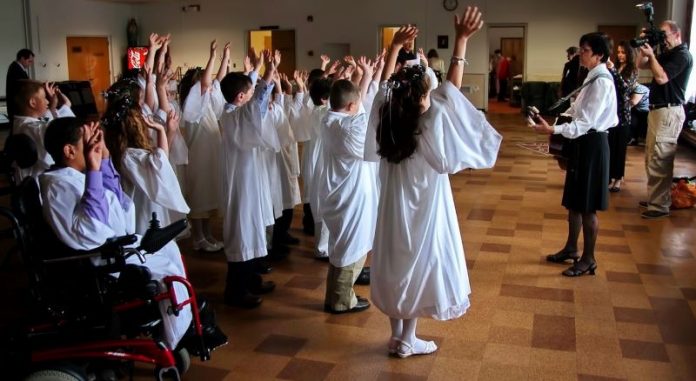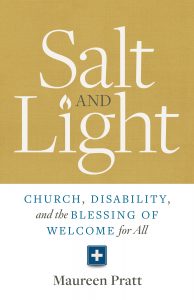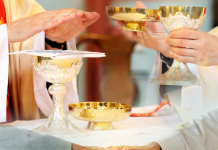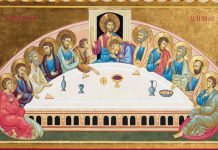
 An excerpt from Salt and Light
An excerpt from Salt and Light
MAUREEN PRATT
Catechesis is a must for all members of the body of Christ, including persons with disabilities. The church community that opens itself to the possibility of sacramental preparation for all children, regardless of their disability, sparks potential for confidence, joy, and personal development that can lead to endless blessings. Amazing progress in understanding learning difficulties and teaching to and through them have enabled children and adults to learn much more effectively in the past few decades. The same diagnostic and educational techniques applied in academic settings are also being adapted in catechesis for persons with many different disabilities; children with Down syndrome, autism, Asperger’s, and other, often-complex disabilities are being introduced to Jesus and growing in understanding much more broadly than ever before. This is also enabling many more young Catholics (and adults, too) to participate in liturgy and in ministries and to enjoy gathering as part of the entire church community.
Catechesis, in a particular way, is called to discover and test congruent forms so that each person, with their gifts, limitations, and even severe disabilities, can encounter Jesus on the journey and trustfully abandon themselves to Him. No physical or mental limitation should ever be an impediment to this encounter, because Christ’s face shines in the heart of each person.
— Pope Francis (Catechesis and Persons with Disabilities: A Necessary Engagement in the Daily Life of the Church). Learn more at CATmag.us/Engagement.
In practice, this kind of adaptive catechesis recognizes how someone learns and uses methods that correspond to that process. For example, a child with autism might not be able to process verbal language “normally,” but could perhaps learn by a combination of pictures and demonstrations; pictures and words, and color and texture, could play an additional role in effectively communicating messages for the completely nonverbal.
Other accommodations could be used to teach other aspects of the faith. For example, sounds could be used creatively to help persons who are sight-impaired or blind to navigate the liturgy.
Attitudes play a key role in opening minds and hearts to the possibilities of adaptive catechesis. Parishes with no history of religious education for persons with special needs might not know where to begin. Some clergy might be dubious that a child or adult with a severe impairment could ever understand enough to be able to validly receive one or more of the sacraments. And parents themselves might doubt that their child is able or “worthy” enough to try.
An attitude of informed understanding and willingness is most effective from the “top down,” that is, from the pulpit to the pews. No faith community can have a successful catechetical program without the full support of its clergy. But there are resources that can be very helpful to all members of the church community, and it really doesn’t matter who gets the ball rolling, so long as it rolls!
Here are some suggestions
■ Current parishioners who have experience and training in special education can speak up about the possibilities today’s teaching techniques present for effective catechesis to persons with disabilities.
■ Parents of children with disabilities can teach skeptics about the successes that take place within special education programs in schools and show how these can be translated to catechesis.
■ Published adaptive programs for specific disabilities (some are included in the Resources chapter of this book) can be purchased and reviewed for their content and feasibility for use in parish communities.
■ Attention to safety and protection of minors is especially important regarding persons with disabilities. Children with disabilities are at higher risk of abuse than those who do not have them, and adults with severe disabilities are also vulnerable.
■ Programs in dioceses that serve as models for others, and information included on their websites, are excellent resources for parents, clergy, and religious education teachers to review.
Lifelong catechesis
Preparation for the sacraments is a central task of catechesis. But learning about our faith and the ways it informs our lives takes place throughout our earthly journey, and persons with disabilities are just as eager to learn about the faith as those who do not have them. Church communities that offer some specific support for persons with ongoing disabilities and other chronic health conditions will be providing a much-needed and vital service.
MAUREEN PRATT has lived, studied, and written in the areas where faith, disability, and chronic pain and illness meet. A popular speaker, workshop leader, and author, her latest award-winning book is Salt and Light: Church, Disability, and the Blessing of Welcome for All.
EDITOR’S NOTE: Excerpted from Salt and Light: Church, Disability, and the Blessing of Welcome for All, by Maureen Pratt. Copyright 2018. Published by Twenty-Third Publications (TwentyThirdPublications.com). Used with permission. All rights reserved. This is an excerpt from the chapter “Catechesis and Participation.” To read the entire chapter, go to Catechist.com/SaltAndLight.
This excerpt was originally published in Catechist, March 2020.




